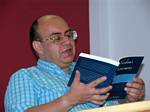
|
Home > About > Conferences > Galway 2007 > List of Papers > Abstract: Rodríguez |
|
Adventurers, Emissaries and
Settlers:
Ireland and Latin America
Overview -
List of Papers -
Schedule -
Gallery |
|
Abstract Freedom's mercenaries Moisés Enrique Rodríguez (Vevey) Between
1817 and 1825, 10'000 "British" mercenaries, many
of them veterans of the Napoleonic Wars, left Europe to join
the armies and navies of Bolivar, San Martin and other
leaders, who were fighting to liberate their countries from
the colonial domination of At
this time, the term "British" was used to refer
not only to Englishmen, Scotsmen and Welshmen but also to
Irishmen ... and often "English" or ("Inglés")
was a blanket term for anyone coming from the This paper is based upon the book
"Freedom's Mercenaries", published by the author
in 2006. In the
words of a reviewer, Professor Karen Racine of the
As a Colombian educated in Among other subjects, the paper deals with the Irish legion (including its last
contingent, who did not serve - or mutiny! - in the
Guajira), the Rifles battalion (led by Arthur Sandes' Irish
officers), Bolivar's staff officers (two Irishmen - Daniel
O'Leary and William Ferguson - and an Englishman - Belford
Hinton Wilson) and |
|
|
|
Online
published: 24 April 2007 Edited: 07 May 2009 |
| The Society for Irish Latin American Studies |
Copyright Information |
|
